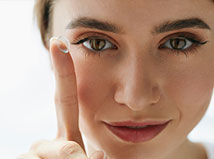How to View the Solar Eclipse Safely

North Carolina Eye, Ear, Nose & Throat Ophthalmologists Milton James, MD and Daniel Simon, MD are ready for Monday's solar eclipse. They're wearing eclipse glasses that meet the ISO 12312-2 international standard filters for direct sun observation.
Dr. James, a retinal specialist, reminds us that looking at the sun directly during the eclipse can cause solar retinopathy. “This is when the sun's UVA rays injure the cells of the central retina in the back part of your eye,” said Dr. James. “The eye works like a traditional box camera where the retina serves as the film in the camera. If the film is exposed/damaged then you’ll have a poor-quality image. “
Retinopathy - damage from viewing sun rays directly
According to Dr. James, injury from solar retinopathy can occur acutely or more gradually based on the person and/or length of exposure.
There are no exceptions to the rules for safely viewing a partial solar eclipse. To make sure people have the facts, the American Academy of Ophthalmology has teamed up with the American Astronomical Society to offer these five tips:
- Use specially designed solar eclipse glasses and viewers to block the sun’s harmful rays. Ordinary sunglasses, even dark ones, are not strong enough to protect your eye.
- Inspect your solar filter before the eclipse, and don't use it if it's scratched or damaged.
- Another option is to view the eclipse through #14 welder's glass. That's much darker than the shades arc welders typically wear.
- Use solar filters on camera lenses, binoculars, and telescopes.
- Do not use solar eclipse glasses to look through a camera, binoculars or a telescope. The sun can melt the filter and damage your eyes.
For more information on solar eclipse safety, visit the American Academy of Ophthalmology’s EyeSmart® website. The American Astronomical Society also has resources on its website, including tips for how to shoot still images or video of a solar eclipse.
So how can you see the eclipse if you don’t have glasses?
Dr. James suggests watching it on your TV, computer or smart phone, basically any other way than direct viewing.
Source: American Academy of Ophthalmology



